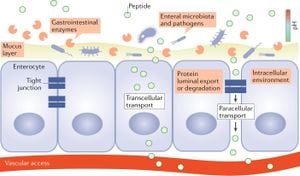The results of the 2025 Bundestag election have revealed strong support for the Alternative for Germany (AfD) party, particularly within the state of Mecklenburg-Vorpommern. This election marked significant shifts in voting patterns across various constituencies, including Usedom, Neuenkirchen, and Schwerin.
According to local reports, Usedom, part of the Landkreis Vorpommern-Greifswald, saw the AfD capturing 57.6 percent of the second votes, leading significantly over the Christian Democratic Union (CDU), which garnered only 13.4 percent. Following them were the BSW with 8.9 percent, the Social Democratic Party (SPD) at 7.3 percent, and Die Linke at 6.6 percent. This brought the total voter turnout to 45 percent among 1,496 eligible voters. These figures show the AfD's substantial improvement since the previous election, where they reported only 35.1 percent, reflecting an impressive gain of 22.5 percentage points.
Meanwhile, the results from Neuenkirchen, located in Landkreis Vorpommern-Rügen, were similarly telling. Here, the AfD emerged as the leading party with 40.4 percent of the vote, overtaking the CDU, which received 17.6 percent. Other contenders included Die Linke and SPD, both securing 11 percent and 9.6 percent, respectively. Election reports note the voter turnout was higher at 58 percent among 235 eligible voters. This shift is particularly significant as the AfD was previously third, receiving just 20.3 percent of the votes during the 2021 election.
Schwerin, the capital of the state and home to 75,436 eligible voters, also witnessed the rise of the AfD, which received 27.1 percent of the votes compared to 18.2 percent for the CDU and 16.3 percent for the SPD. The voter turnout was noted at 79 percent. The AfD's performance reflected drastic changes from the 2021 election, where they only had 13.7 percent of the vote, indicating the party's growing influence and appeal.
The outcome of these elections must be viewed within the larger framework of the parliamentary representation system. Under recent electoral reforms, the second votes primarily determine the number of seats allocated to each party within the Bundestag. This means even if direct candidates receive the most first votes, it does not guarantee their admission to the parliament if the party's second vote share does not support it. This rule significantly complicates the electoral arithmetic for various parties.
For the SPD, the loss has been particularly pronounced. Reports indicate the party experienced significant drops, with losses of 11.2 percentage points in Usedom. Meanwhile, the SPD had previously been the dominant party with 21.1 percent of the votes in Neuenkirchen during the last election but saw its share reduced significantly, illustrating the changing political tides.
One of the key takeaways from this election is the notable support for the AfD, following years of increasing popularity among voters who may feel disenfranchised by traditional parties. “The AfD is now the strongest force in Neuenkirchen with 40.4 percent of second votes,” highlights the seismic shifts taking place. Support for the AfD appears driven by growing concerns over immigration, economic stability, and political representation.
The ramifications of these election results will be felt not just locally but also at the federal level, as they suggest shifting political sentiments across the country. Local political analysts are already discussing the potential impacts this could have on legislative priorities and national policies moving forward as these voting patterns become more entrenched.
Overall, the 2025 Bundestag election results across Mecklenburg-Vorpommern point to significant political changes on the horizon, particularly with the AfD's enhanced position within local and potentially national contexts. With shifting voter sentiments and the restructured electoral framework influencing representation, these developments warrant close attention as Germany navigates its political future.



